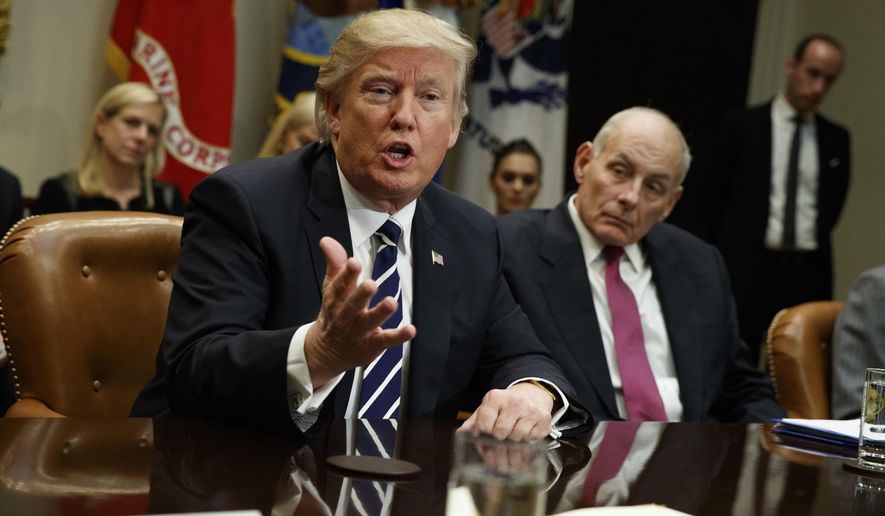Trump administration officials believe that a Department of Homeland Security report that undercut the president’s position on his travel ban was drafted with the express intent of leaking it to the press, a source close to the department says.
The source said the report was drafted by those loyal to the Obama administration inside the department’s office of intelligence and analysis. The drafters relied solely on open source material, which meant it could be delivered to reporters without violating federal laws on mishandling classified information.
“This was not really a leak but sabotage,” the source said. “This report was commentary. This is insurrection. They all took an oath.”
The leak to The Associated Press appears to follow a pattern of suspected Obama loyalists still inside the government releasing draft documents that are immediately refuted by the White House, such as a supposed plan to mobilize the National Guard to arrest illegal criminal immigrants.
In an executive order, President Trump sought a temporary ban on immigration from seven countries deemed a high terrorism risk. A federal appeals court blocked the order.
In the meantime, the White House asked for a comprehensive intelligence report from several agencies on the terrorism threat to the U.S. by people from those countries.
What leaked from Homeland Security was a scant three-page report that said the threat of terrorist arrivals is dispersed among other countries and that citizenship is not a good gauge.
The administration says there is far more information on those seven countries, some of it classified, that needs to be included in a final report.
For example, the report is limited to court cases, which leaves out confidential FBI data on terrorism suspects. The FBI has said it is monitoring scores of U.S. residents for terrorism ties but does not disclose their identities or, if pertinent, their countries of origin.
The source said aides to Homeland Security Secretary John F. Kelly met to discuss the draft report and it was conveyed that it needed more work.
Among the Homeland Security intelligence representatives was David Grannis, principal deputy undersecretary in the office of intelligence and analysis.
Mr. Grannis was the Democratic staff director of the Senate Select Committee on Intelligence under Sen. Dianne Feinstein of California. He joined the Homeland Security Department in January 2016.
Reached by The Washington Times, Mr. Grannis declined to comment.
Homeland Security press secretary Gillian Christensen dismissed the draft report as an “incomplete product.”
She said in a statement: “The seven countries were identified by the previous administration as being countries of concern for foreign terrorist travel to the United States. Consequently, these countries were the focus of this administration’s initial efforts to enhance vetting for foreign travel to the United States. It is the policy of the United States to protect its citizens from foreign nationals who intend to commit terrorist attacks in the United States; and to prevent the admission of foreign nationals who intend to exploit United States immigration laws for malevolent purposes.
“The document referenced in this report and others was incomplete and had not been subject to the extensive interagency review process required of finished intelligence products. Further, the report does not include data from other intelligence community sources. It is clear on its face that it is an incomplete product,” she said.
Ms. Christensen rebutted allegations that the report was criticized internally for political purposes: “Allegations by opponents of the president’s policies that senior DHS intelligence officials would politicize intelligence is unfortunate and untrue. The dispute with this product was over sources and quality, not politics.”
Rep. Mac Thornberry, Texas Republican and chairman of the House Armed Services Committee, last week said Obama loyalists inside the Pentagon are not embracing Mr. Trump’s call to boost military readiness and buy more equipment.
Defense Secretary James Mattis has no Senate-confirmed aides in place.
“The problem is it’s Secretary Mattis alone right now,” Mr. Thornberry said. “So you have a number of people, political appointees and others from the Obama administration, and they have been the ones trying to deny there’s a problem. They’re well-intentioned people, patriotic Americans, but it’s hard for any of us to turn 180 degrees in the other direction.”
All but six Obama political appointees have left the Pentagon. But during Mr. Obama’s eight years, many Democrats landed jobs there in the senior executive service or civil service, which are immune from political dismissal.
Political appointees typically submit resignations in December when a different political party is preparing to take over the White House.
The Trump administration is only in its seventh week. It takes months for an administration to win Senate confirmation of assistant secretaries, undersecretaries and deputy secretaries to carry out orders to the bureaucracy.
Mr. Trump has railed against “fake news” in the liberal mainstream media and against leaks, some of which violate laws on protecting secrets.
Democratic Party officials have stated that they have no plans to work with the Trump administration and have taken to calling their stance “resistance.” Some want Mr. Trump impeached immediately.
• Rowan Scarborough can be reached at rscarborough@washingtontimes.com.




Please read our comment policy before commenting.